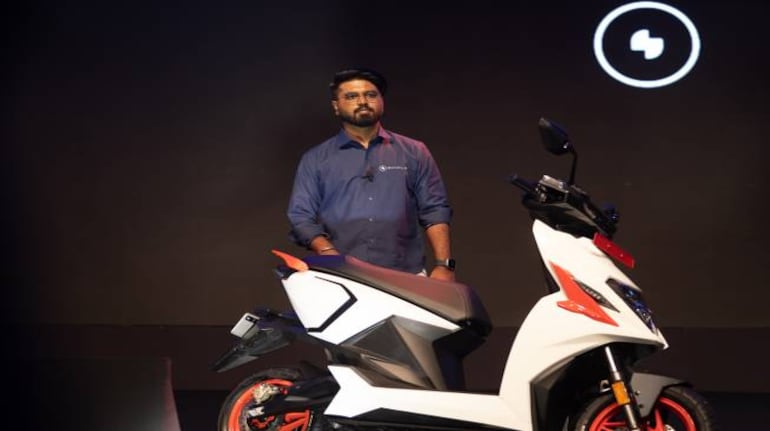



At a time when numerous Electric Vehicle (EV) startups are planning to crack the sub- Rs 1 lakh electric two-wheeler (E2W) market, Simple Energy says it will not be coming up with any battery-run scooters that is priced below Rs 1 lakh.
The Bengaluru-based Electric Two-Wheeler (E2W) startup, which recently launched Simple One, at a price of Rs 1.45 lakh (ex-showroom), is gearing up to launch a couple of additional electric scooters and an e-motorcycle in the medium term.
In an exclusive interaction with Moneycontrol, Suhas Rajkumar, Founder and CEO, Simple Energy, said: “For us, affordability is value rather than offering a scooter priced below Rs 1 lakh. So, if a company A is giving you 80 km range and 50 km top speed and charges you Rs 120,000, that is unviable. I would rather give you a 120-km range and 90kmph (top speed) at the same price. Our products will be considered more affordable and value-for-money rather than anything else.”
Without sharing specific details, Rajkumar indicated that the upcoming e-scooters, which will be based on the same platform that underpins Simple One, will be priced in the range of Rs 1 lakh to Rs 1.5 lakh, and will be hitting the market in the coming quarters. While one of them will be performance-oriented, the other will be utility-built.
Aiming to be an EV maker across segments, the company is also drawing up plans to launch a battery-powered electric car in the next couple couple of years.
Why go for premium scooters?
When asked about the rationale behind going for premium scooters, Rajkumar stated: “Giving a lower spec and reducing the cost (of the e-scooter) is a no-brainer. That doesn't need a company's big heads to look at. What we're looking at is creating a unique experience with a product that you buy from us rather than something that is cost-efficient. Although there is a market (for low-cost e-scooters) but we don't look at that segment to be very ground-breaking, or something appealing to us for innovation.”
Unlike other battery-powered scooters in the market, the company is banking on Nickel Manganese Cobalt (NMC) chemistries rather than those on Lithium-ion Iron Phosphate (LFP). In his view, LFPs are not really “great friends with form factors” and come in “large sizes”.
“Anyone out there in the premium segment is always working on NMC and using the same cell form factor. So we manage energy better than others. And that's why we have much better efficiency than our peers. So that's the X factor in the system. Otherwise, everyone has the same kind of cell, chemistry, etc." added Rajkumar.
Both LFP and NMC are based on Lithium-ion cells but the latter delivers a higher range per charge than the former.
The EV maker has received one lakh bookings for Simple One, which is equipped with fixed and removable batteries and delivers a claimed range of 212 km in IDC (Ideal Driving Conditions).
The company has created an Intellectual Property (IP) portfolio of about 200+ for the technologies that it has developed for its product lines.
“A lot of scooters out there don't really have a certain kind of efficiency that is required to achieve that extra 20-25 percent of efficiency in range. Furthermore, we manufacture battery packs and design and manufacture our motors in-house. So we control the end-to-end of the energy systems that we have,” Rajkumar further added.
Simple Energy has ambitious plans to clock 30,000 units per month and is also aiming to be the market leader in the E2W market in the country within a year. It is looking at fulfilling all orders in the next 12-15 months, and hit a top line of around Rs 1,500 crore by FY 24.
“I think what is going to happen now is that serious players are coming in and there will be some consolidation in the market. We don’t intend to get into a FOMO (fear of missing out) and start scaling something that is not good for the consumers. We are okay to be slow and be customer-focused. And we'll start looking at expansion based on our customer feedback,” Rajkumar said.
The Bangalore-based firm has invested Rs 100 crore for setting up its manufacturing facility at Shoolagiri, Tamil Nadu, which has an installed capacity of 25,000 units per month and plans to invest a similar amount to nearly double its output in the future. The company, which has cumulatively raised under $50 million until now, is in talks to raise Series-A funding of $100 million from global investors along with existing investors Manish Bharti, and Raghunath Subramanian.
Discover the latest Business News, Sensex, and Nifty updates. Obtain Personal Finance insights, tax queries, and expert opinions on Moneycontrol or download the Moneycontrol App to stay updated!
Find the best of Al News in one place, specially curated for you every weekend.
Stay on top of the latest tech trends and biggest startup news.